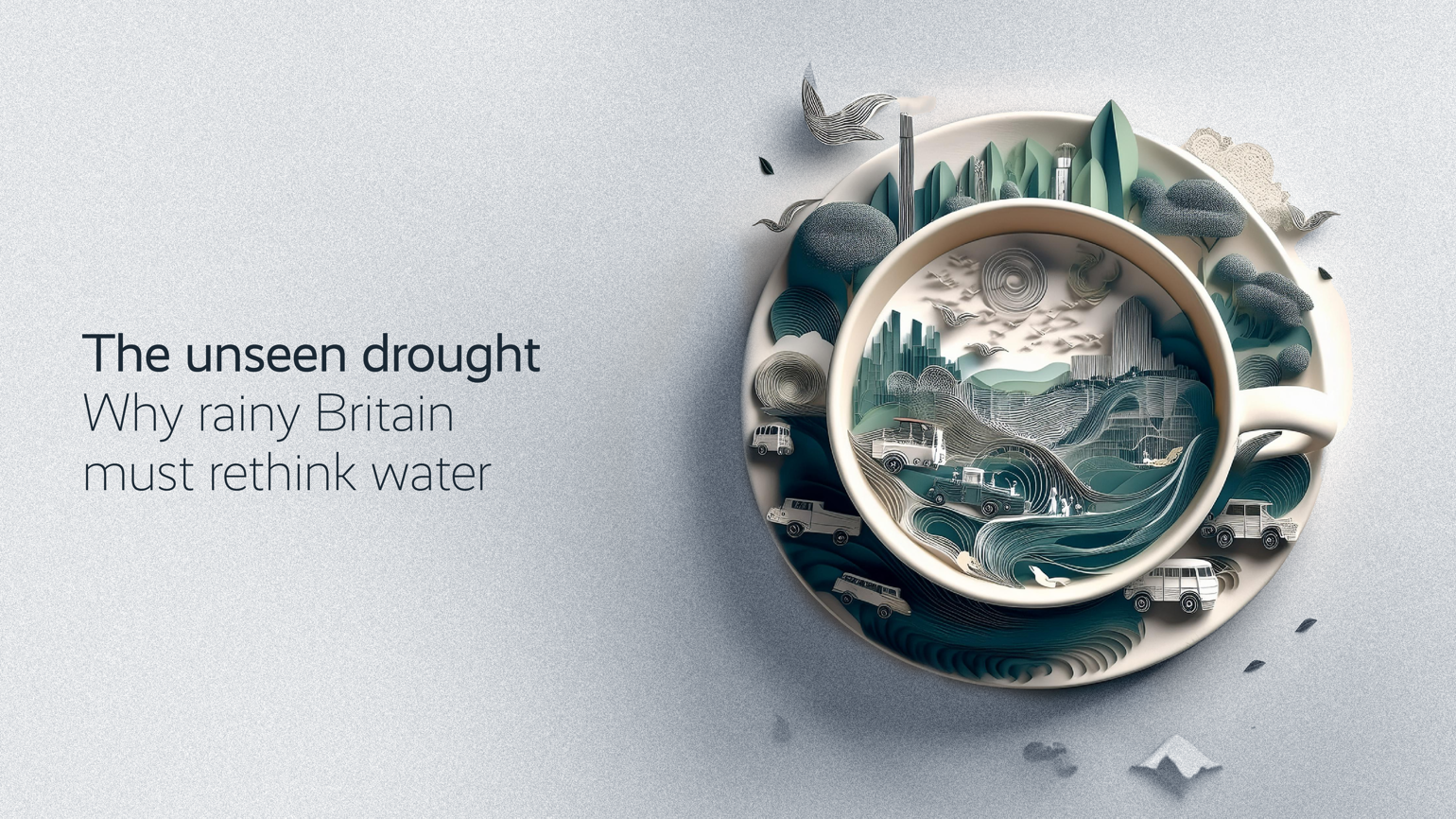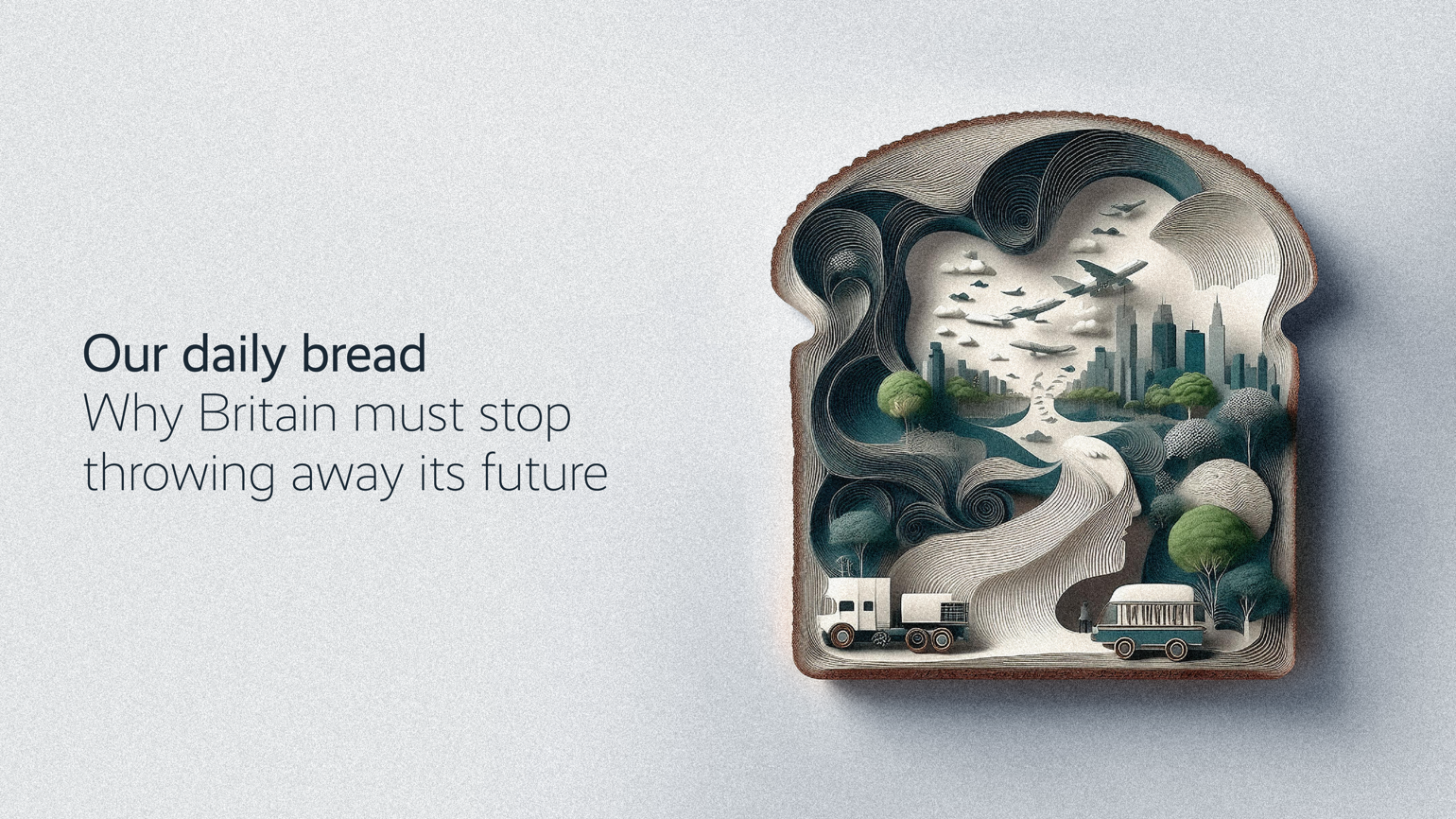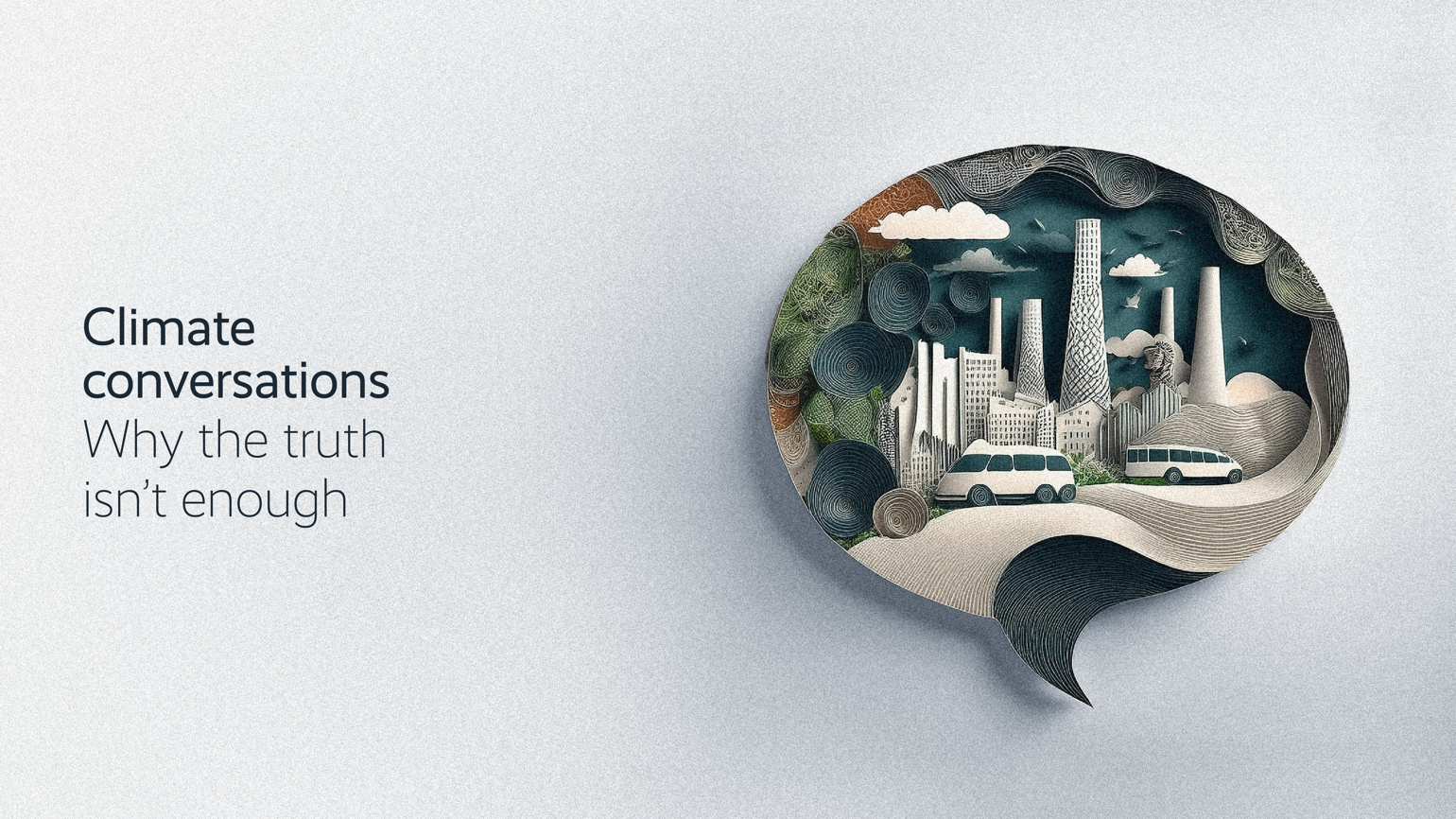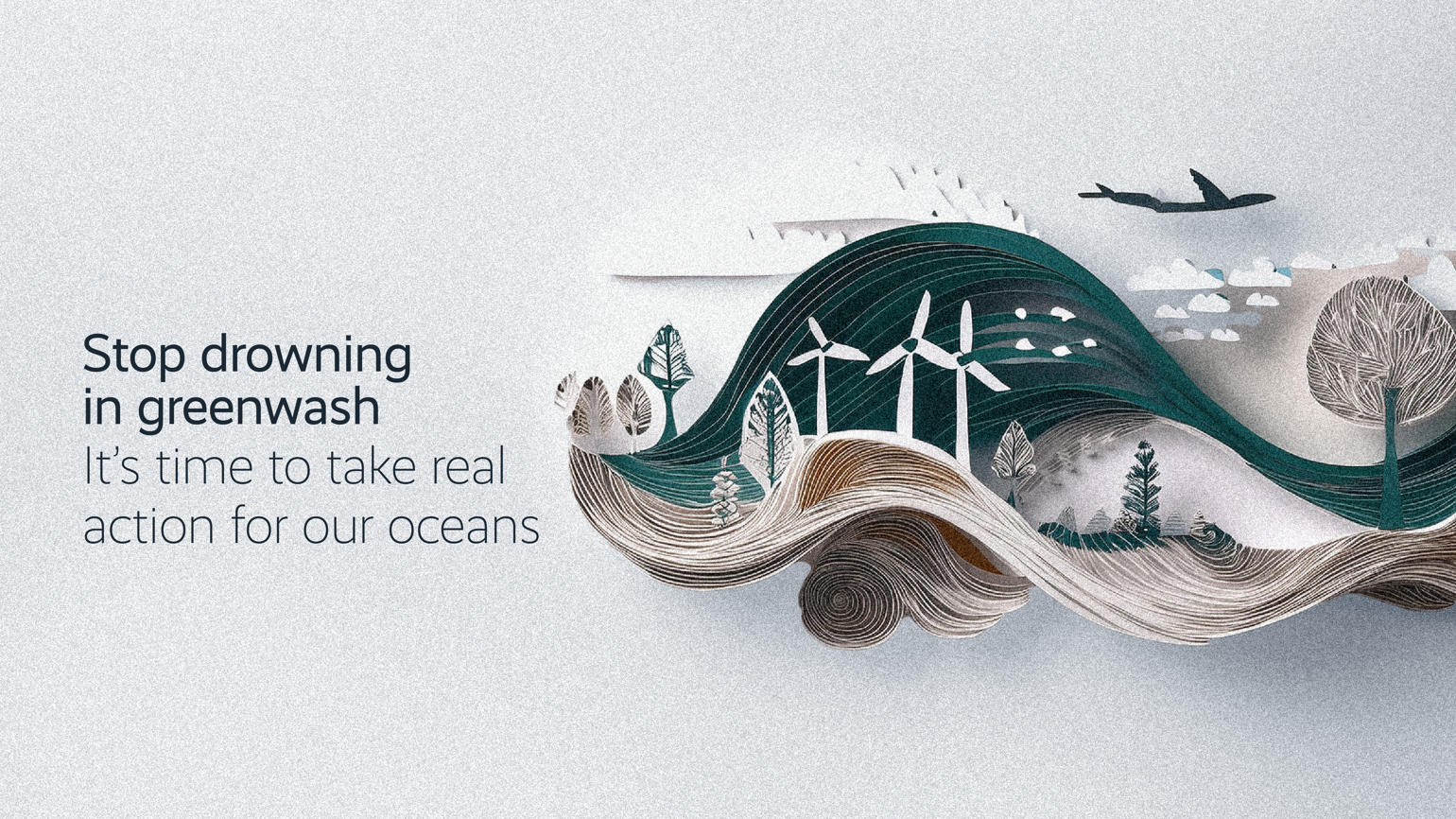Return to journal
Environmental issues and behaviour change theory
Our Senior behavioural strategist, Katharina Besenbruch, explores how understanding the human mind might just be the key to driving action in your sustainability communications

Our planet is in crisis, yet humanity's response remains frustratingly muted. It's not for lack of awareness – environmental concerns regularly top public polls. So why the inaction?
The culprit, it seems, is our own psychology. Our brains, honed by evolution for immediate threats, struggle to process the abstract, long-term nature of climate change and ecological collapse.
This series explores how understanding the human mind might just be the key to driving action in your sustainability communications.
From reframing water scarcity in rainy Britain to nudging food waste habits, our 4 behavioural science-informed examples prove that with the right message, we can indeed spur the urgent action we all need.

On a typical British day, the skies are a familiar shade of grey, and the pitter-patter of rain is as much a backdrop as the red buses trundling through London's streets. It's the kind of scene that might leave one incredulous at the notion of water scarcity. But beneath this wet veneer lies a burgeoning crisis that we can no longer afford to ignore. As someone deeply concerned about our environment and the legacy we leave for future generations, I find the juxtaposition between our perceived water abundance and the stark reality of our situation alarming.
A nation bathed in rain, starved for water
Here in the UK, our water issues aren't painted in the parched, arid hues of those faced by other countries, making them easier to overlook. Despite the deluge of unseasonal rain—2024 has seen record-breaking rainfall, with May alone witnessing 116% of the average rainfall and northern England experiencing 155% of its typical May rainfall—the paradox of water scarcity persists. This excessive rainfall has led to waterlogged fields, resulting in significant crop failures and financial losses for farmers. Our aging infrastructure can't harness this abundance. Excessive rain overwhelms systems, contributing to water stress.
And the threat of water scarcity in the UK is more real than many realise. According to the Environment Agency, England could face significant water shortages by 2050 if action is not taken. Our reservoirs are not bottomless, and our aging infrastructure struggles to keep pace with the demands of a growing population. The UK's population is projected to reach 72 million by 2041, placing unprecedented stress on water resources.
Climate change exacerbates this paradox, bringing more intense rainfall and prolonged dry spells. The wettest six-month period since 1871 (October 2023 to March 2024) illustrates this volatility. Yet, memories of the 2018 drought, which saw reservoirs at critical lows, linger. This juxtaposition of flood and drought, abundance and scarcity, demands immediate attention. Our water future hangs in the balance, caught between the illusion of plenty and the reality of increasing demand, aging infrastructure, and climate unpredictability.
Changing tides: How behavioural science can help
The challenge, then, is not only to conserve water but to change the very way we think about it. Behavioural science offers us tools potent enough to rewrite the narrative. Theories like the Theory of Planned Behaviour show pathways through which we can transform private and public attitudes. They teach us that behaviour is a function of social norms, attitudes, and the perceived ease or difficulty of taking action.
One successful application of behavioural science is Northumbrian Water Group's initiative to promote water-saving habits. They utilised tangible reminders to connect water-saving actions with real-world benefits. For example, they highlighted that using an eco-setting on a washing machine could save around £40 a year and equates to saving the water used for 18 cups of tea per cycle. This approach makes the abstract concept of water conservation more concrete and relatable, effectively changing consumer behaviour by making the benefits visible and immediate.
The local lens: Making conservation personal
Effective communication must bring the issue close to home. Imagine receiving a water bill that doesn’t just list charges but compares your usage to that of your neighbours, nudging you towards a more mindful consumption. Local councils could promote "dry garden" contests or offer rebates for water-efficient appliances before the summer droughts set in. These initiatives speak directly to us in our own communities, making the abstract notion of "conservation" both tangible and urgent. We need narratives that resonate. Stories of local heroes who retrofit their homes to collect rainwater, or farmers using innovative, water-saving techniques to battle drought. These stories can power a movement, transforming the way we all think about and use water. Just as importantly, they can inspire our communities to adopt new norms around water use, shifting the dialogue from why we must change to how we can change together.
A call for a new culture of conservation
As we stand looking out at another rainy day, it might be hard to imagine that we could ever run out of water. But the truth is, we might by 2050. The time to act is now, to redefine what it means to live on an island famed for its rain. We must build a culture of conservation that runs as deep as our love for tea and as strong as our penchant for talking about the weather.
Navigating the complex landscape of water conservation requires more than superficial changes—it demands deep, strategic communication that resonates on a personal level. At Radley Yeldar, we've collaborated with organisations like Water UK and Northumbrian Water Group to design campaigns focused on water conservation, smart meter installation, and reframing the value of water, all informed and guided by a deep understanding of behaviour change and sustainability communication principles.

In the UK, a staggering irony persists: as food banks receive more visits each year, our bins overflow with edible food. This wasteful contradiction isn't just a failure of distribution; it's a sign of a deeper cultural malaise around food, its value, and its cost to our environment. The issue of food waste is as pressing as any other environmental challenge we face today, and addressing it requires more than piecemeal solutions—it demands a comprehensive overhaul of our attitudes and behaviours.
Understanding the waste
The statistics are damning. Britain throws away millions of tonnes of food annually—enough to fill the London Eye thousands of times over. This isn't merely a financial drain; it's an environmental disaster. Wasted food clogs landfills, emits methane, and squanders the water and energy used in its production. But the root of this problem lies not in our policies, but in our kitchens, supermarkets, and restaurants.
Behavioural Science: A spoonful of insight
Behavioural change is not about coercion. It's about understanding why people act as they do and guiding those actions toward better outcomes. The Theory of Planned Behaviour points us to a truth: our actions are dictated by our attitudes, the norms we absorb, and our belief in our ability to influence our outcomes. To combat food waste, we must work on all these fronts.
Crafting messages that matter
Effective communication must strike at the heart of the issue and resonate personally:
- Changing attitudes: Campaigns should connect individual actions to global consequences. This isn't just about guilt over the bin—it’s about realising the broader impact of every slice of bread and leftover meal. For instance, our food waste campaign with WRAP, "Be Mighty," tackled key barriers like the yuck factor and motivated the nation to recycle food waste and prevent it. By highlighting moments of change, such as meal prep, and emphasising financial and environmental gains, we saw a significant shift in behaviour.
- Shifting social norms: Showcasing businesses that have successfully reduced their waste or communities that share excess food fosters a culture where wasting food is frowned upon. In our collaboration with WRAP, we used behavioural science techniques to emphasise positive social proof. This led to 50% of existing users feeling more motivated to recycle their food waste and 10% of non-users starting to use the service.
- Enhancing control: People often feel powerless due to a lack of knowledge. Providing clear, simple guidance on storing different foods, understanding 'use by' versus 'best before' dates, and cooking with leftovers can empower individual change. Our "Be Mighty" campaign for WRAP effectively educated the public, resulting in at least 30% of people using up more food in meals and 15% throwing less food into the general bin by March 2024.
By using these strategies, we've seen measurable results in changing public behaviour towards food waste. Effective communication, backed by evidence and real-world examples, can drive substantial change in attitudes and actions.
Bringing the change home
This isn't just a job for policymakers; it's a role for storytellers, educators, and local leaders. Imagine if every supermarket had a 'smart bin' that showed the amount of food thrown away each day, or if schools competed for the least wasteful lunch week? Visual, community-cantered strategies like these can turn the abstract into the undeniable.
A role for everyone
As we look to shift our culture around food waste, each segment of society has a part to play. Families can learn meal planning to avoid over-purchasing. Restaurants can adopt more flexible ordering systems to reduce leftover ingredients. Local governments can facilitate more widespread composting and community sharing programs. And communications experts like Radley Yeldar can help craft these messages, ensuring they reach every corner of the country with resonance and impact. For instance, we have already helped WRAP change behaviours around food waste for over 508,000 adults in Wales, increasing the rate of food recycling service usage from 78% to 80%, representing a notable 2.5% rise.
This is about more than saving scraps; it's about saving our environment and rethinking our place within it. Let’s make the act of throwing away food socially unacceptable, not just because it's a waste of money or even food, but because it's a waste of our shared resources. Our actions today are shaping tomorrow's norms, and it's time we ensure those norms are ones of conservation and care.

In the face of rising sea levels, scorching heatwaves, and devastating wildfires, the reality of climate change has never been more apparent or more terrifying. Yet, as the planet warms, public discourse on climate seems paradoxically frozen. Why? Because the current language of climate crisis—a lexicon filled with "unprecedented disasters" and "inevitable doom"—is failing us. It's not that these phrases aren't true; it's that they're paralyzingly ineffective. If we want to mobilise widespread climate action, our communications need a radical overhaul.
The problem with climate pessimism
The way we talk about climate change is mired in catastrophe. For too long, the narrative has been dominated by visions of a dystopian future, compelling us to act out of fear rather than hope. While this might grab headlines, it numbs the public. Psychological research suggests that when faced with seemingly insurmountable challenges, many people default to denial and despair—not engagement and action. This doom-focused messaging also abstracts the problem. It transforms tangible, immediate threats into distant, apocalyptic visions. "Save the Arctic ice sheets" may be a scientifically urgent plea, but it feels irrelevant to someone facing daily struggles in London, Berlin, or Chicago.
A call for optimistic realism
We need a new narrative: one of optimistic realism. This isn't about sugar-coating the truth—it's about framing it in ways that inspire positive engagement. We must balance the harsh realities of climate change with stories of opportunity and progress. For instance, the green energy sector is booming, offering economic opportunities and job creation that can be harnessed right now, particularly in post-industrial areas needing revitalisation.
A prime example of effective messaging is the "We Are Still In" campaign launched in the United States after the withdrawal from the Paris Agreement. This initiative successfully united businesses, cities, and universities to reaffirm their commitment to climate action, emphasising the economic and environmental benefits of transitioning to green energy. This approach not only maintained momentum but also inspired a broad base of support by highlighting the tangible, positive impacts of climate initiatives.
Local stories, global impact
Localising the effects of climate change can bridge the gap between global phenomena and individual action. We should focus on the immediate, local impacts of climate change, making it relevant to everyone’s backyard. If people understand that their local environment and weather patterns are changing—increasing flood risks in North Yorkshire, for instance, or affecting crop yields in East Anglia—they are more likely to feel connected to the issue.
Moreover, highlighting local success stories in tackling climate issues can serve as a powerful motivator. For example, the city of Freiburg in Germany is often cited as a leader in urban sustainability. By transitioning to renewable energy sources and implementing energy-efficient building standards, Freiburg has significantly reduced its carbon footprint and improved the local environment. This success not only benefits Freiburg but also provides a replicable blueprint for other communities worldwide. Similarly, in Bristol, UK, the "Bristol Green Capital" initiative engaged local residents and businesses in sustainability efforts, resulting in a substantial reduction in the city’s carbon emissions and fostering a sense of community pride and collective action.
The role of collective empowerment
Emphasising collective action over individual guilt can transform anxiety into action. The narrative should shift from "what you’re doing wrong" to "how we can do this right together." By fostering a sense of community and shared purpose, communications can encourage a collective movement towards sustainability. A great example of this approach is the "Plastic Free July" campaign. This global movement encourages millions of people to reduce their plastic waste. Rather than focusing on individual failings, the campaign promotes collective action by sharing success stories, providing practical tips, and creating a sense of global community working towards a common goal. Participants often share their experiences and tips, fostering a supportive environment that amplifies the impact of individual actions through a collective effort.
The climate crisis is the most significant challenge humanity faces, but the doom-laden rhetoric currently dominating public discourse is not the solution. We need to revitalise our approach to climate communications with optimism, focusing on actionable, localised initiatives that demonstrate the tangible benefits of engagement. Only then can we unlock the collective energy and creativity needed to tackle this crisis effectively. As we reshape the narrative around climate change, let’s use our words to empower, not paralyse, setting the stage for a revolution in green thinking that includes everyone, everywhere.

We stand at the supermarket checkout, products in hand, convinced we're champions of the ocean's cause. Organic this, eco-friendly that—our shopping baskets are a testament to our green credentials. Or so we believe. The truth is, while we're patting ourselves on the back for these choices, our oceans continue to choke on plastic, suffer from overfishing, and lose vital habitats. It’s high time we faced it: the sustainable purchasing movement as it stands is a sea of greenwash—ineffective and misleading—and it's doing little to stem the tide of marine destruction.
The myth of the 'green' purchase
Let’s be honest—current sustainability claims are a murky business. "Biodegradable" often doesn't mean what we think, "sustainably sourced" is vague at best, and the impact of these choices on the ocean is dubious. This green haze benefits businesses more than it does our seas, offering consumers a false sense of accomplishment and an excuse to continue consuming unchecked.
The real deal on effective ocean-saving shopping
If we genuinely want to leverage our purchasing power for the ocean's benefit, we need to cut through the greenwash and revamp our approach to consumerism.
Here's how:
- Demand transparency: We must push for clear, stringent labelling that details a product's true environmental footprint—from water usage to carbon emissions, right down to the packaging. If a product claims to be “ocean-friendly,” let's demand proof.
- Boycott the worst offenders: It's time to stop supporting the industries that are the biggest culprits of ocean damage. This includes companies that contribute to overfishing, water pollution, and habitat destruction. Let’s channel our collective outrage into targeted boycotts that force these giants to change their ways.
- Champion local and low-impact: Global shipping routes pump CO2 into our atmosphere and acidify our oceans. By choosing local, low-impact products, we minimise this damage and support local economies. It’s a win-win that fosters stronger community ties and betters the environment.
Brands need to navigate the challenges of greenwashing and upcoming regulations
As greenwashing becomes a significant concern, consumers increasingly demand genuine sustainability from brands, particularly regarding ocean health. Upcoming regulations will require businesses to provide verifiable data and transparency in their communications, creating both challenges and opportunities. Companies like IKEA and Eileen Fisher lead by example with clear, data-backed sustainability efforts. IKEA's initiatives in sustainable sourcing of materials and reduction of plastic waste, along with their commitment to becoming a circular business by 2030, and Eileen Fisher’s meticulous tracking of their supply chain and use of sustainable fabrics, set industry benchmarks. Effective communication strategies must focus on transparency, education, and consistency, ensuring all claims are data-backed and verified. For businesses, this means adapting to new guidelines with clear labelling and corporate accountability, while consumers will benefit from greater transparency and trustworthy claims, allowing for more informed choices.
View our recent guide to avoiding greenwashing.
Radley Yeldar's role in supporting transparency and credibility
At Radley Yeldar, we understand that real change doesn’t come from sugar-coated messages or half-truths. Our World Ocean Day campaign for the Marine Stewardship Council (MSC) exemplifies our approach. We helped educate the public about the necessity of sustainable fishing with a simple, data-backed message. Successfully rolled out in over 23 countries, this campaign achieved a unified and impactful call for collective change. By focusing on clear, honest, and impactful storytelling, we helped navigate the complexities of new regulations and build stronger, more authentic connections with consumers worldwide.
It’s time to stop floating along with the current of ineffective environmentalism and start making waves. If we want our oceans to thrive, we need to transform our approach to purchasing. Let’s make our meals count—because the oceans can't afford our mistakes much longer.
